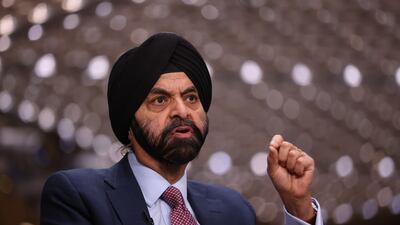US President Joe Biden’s nominee to lead the World Bank called on private sector lenders to increase efforts to fight poverty, citing the need for trillions of dollars in lending that public institutions alone cannot meet.
The World Bank needs to use its current balance sheet and maximise resources, but the total resources of development banks are in the billions of dollars, short of what is needed to boost prosperity and deal with rising challenges, said Ajay Banga, a former MasterCard chief nominated by Mr Biden last month.
Russia’s invasion of Ukraine has created new threats for poor and vulnerable countries, adding food insecurity and inflation to the pressures from the coronavirus pandemic and climate change, he said.
“There is not enough capital in either the multilateral development banks or governments or in philanthropy; we do need to get the private sector to be part of this story,” Mr Banga said in an interview with David Westin on Bloomberg Television’s Balance of Power on Friday.
The World Bank must protect its AAA rating, Mr Banga said, citing the credit grade as core to the bank’s model of borrowing and lending at the lowest possible rates and providing grant assistance.
Mr Banga has co-led the Partnership for Central America, an initiative launched by US Vice President Kamala Harris to marshal private-sector support for the region aimed at creating more economic activity and jobs, with contributions of more than $4 billion across about 50 companies and organisations.
Mr Banga, 63, is on a three-week journey of creditor and borrower nations, with stops planned in countries in Europe and Latin America, to build support for his nomination to lead the Washington-based institution. Mr Banga made his first stop last week in Africa, visiting Kenya and Ivory Coast, a choice that showed his commitment to the World Bank’s core development goals.
The World Bank’s next president will be tasked with reforming the almost 80 year-old institution, a process spurred along by a Group of 20 review of multilateral development banks’ so-called capital adequacy framework released last year and promoted by US Treasury Secretary Janet Yellen, which would allow it to share more funds and take on more risk.
“There are some incredibly important recommendations in that framework,” Mr Banga said. “Some of them will be easier to do, some will be harder, and some will not happen at all, but we’ve got to work our way through them” in terms of consideration, he said.
Mr Banga’s trip comes as Ms Yellen is pushing the development lender to evolve from its traditional focus on country-specific anti-poverty lending, to global objectives like fighting climate change — challenges that Banga on Friday described as “intertwined” — and to more aggressively extend its balance sheet.
While the official nomination process to replace current World Bank chief David Malpass opened two weeks ago — and the bank has hinted that the final selection may not come until early May — Washington’s candidate has traditionally taken the top spot at the World Bank, where the US is the largest shareholder.

